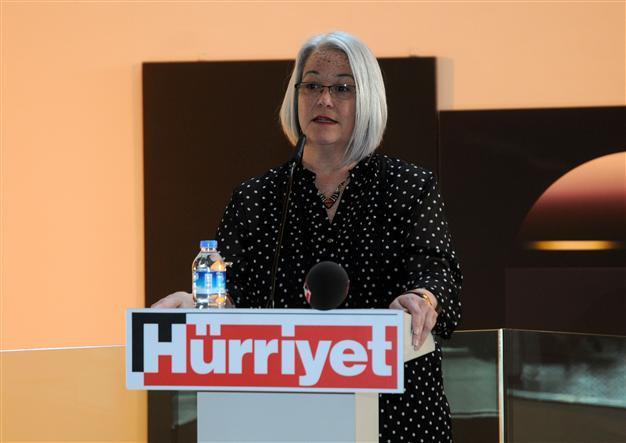Peace journalism discussed at Hürriyet event
ISTANBUL - Hürriyet Daily News

Washington University’s Dr. Susan Dente Ross. DAILY NEWS photo
The main principles and methods of peace journalism were discussed today at Hürriyet headquarters in a conference called “Language of Peace in the Media,” with Washington University’s Dr. Susan Dente Ross highlighting during her speech its effects and contributions to different solution processes in various countries.
Dente Ross started her speech by referencing a previous deadlock in news coverage of the 1973 Paris Peace Accords, with days and days of “dismissive and condescending” coverage of the Vietnamese conflict over the shape of the desk to be used during the meetings. Dente Ross said the symbolic meaning of the desks, which differed heavily for the South and North Vietnamese, traveled loosely to the American media, with news coverage projecting “an image of the Vietnamese as foolish, even childish, that fit neatly with preconceptions.”
Peace journalism, however, “transforms the norms of traditional journalism” instead, Dente Ross said, adding that it “values connection with the people affected by the news” and pays attention to “not only what is occurring in real time but also what the responses to those events will be.”
Dente Ross also said war and peace journalism differed in their orientation and sources. Peace journalism, according to Dente Ross, is oriented toward peace and conflict resolution, multiple perspectives, the people and sustainable solutions whereas war journalism chooses to focus on war and violence, power, the elite and victory.
Peace journalism will have a language “comfortable to all people,” Dente Ross added, saying that it would be a language “that enables people to talk to each other instead of about each other.” Dente Ross further listed other aspects of peace journalism as including positive intentions, compassion, creativity, solution-orientation, dignity and careful monitoring of language against prejudice.
The media can become a force of peace if it promotes a change in the way people think about conflict, affects attitude changes and encourages behavioral changes, Dente Ross said in the closing section of her speech.
